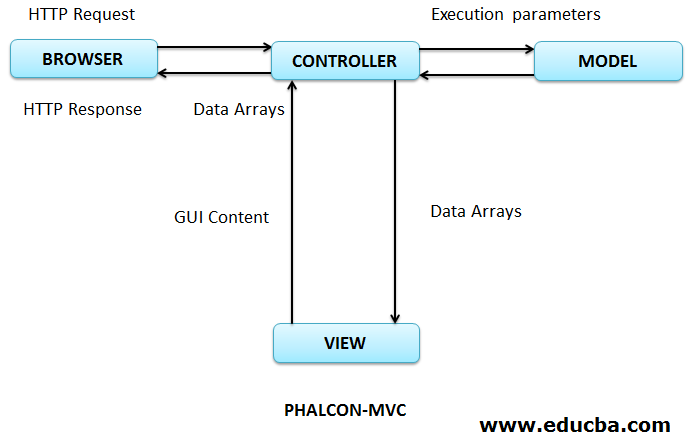
We have seen many frameworks in Software Engineering, out of which we are going to discuss on a PHP framework that is web-based and depends on the Model View Controller pattern (MVC) known as Phalcon Framework. Phalcon is developed by Andres Gutierrez and collaborators. Phalcon Framework being an open-source has been licensed under the BSD license. Phalcon has been implemented as a web server extension written in C and PHP. Helps in boosting execution speed, handle more HTTP requests per second compared to other frameworks. Phalcon framework has been introduced to developers to develop applications with low power consumption and high performance. This article will be helpful for PHP developers, web developers, and web designers.
Start Your Free Software Development Course
Web development, programming languages, Software testing & others

Let us look at the Functionality of the Phalcon framework with Diagram:
Phalcon functionality is based on Model View Controller, so let us see how MVC works. With three layers i.e. Model, View and Controller, MVC platform defines web applications


As Phalcon is loosely coupled, the user can create any directory structure. The main directory is the root folder. The app being the master folder contains all the script folders and files, some of them are:
1. Config: all project configurations will get into this subfolder, a database connection, or third party libraries.
2. Controllers: process requests and give a response, all the controllers which user wants to define will be a part of this subfolder.
3. Library: all the third-party libraries which are of course external will be includes in this folder
4. Migrations: if there is any data migration that needs to be done, then the user can add or edit files in this folder.
5. Models: It includes all interactions related to the database to retrieve and display data. The folder consists of nothing but data completely
6. Views: in Phalcon Architecture or MVC Architecture, views are used to display data to the user. Information related to the view layer will be present in this folder.
7. Cache; It plays an important role in maintaining its role and information related to cache goes into this folder
8. Public: This folder consists of CSS, JavaScript, metadata i.e. data about data, images that are used in the application, files that are to be uploaded based on functionality, and temporary data related to software.
Below are the advantages and disadvantages of Phalcon Framework:
With this we come to an end of this article, with knowing what Phalcon framework means, its uses, structure of its framework, MVC based architectural model which has been explained in detail. Phalcon being new PHP framework, and not as popular as other frameworks like Laravel or others but has better features comparatively. Phalcon also offers Template Engine, Query Language, Clean and well-organized documentation. Takes time to set up but for creating and developing websites, Phalcon is one of the frameworks users should have a try.
This is a guide to Phalcon Framework. Here we discuss the Introduction to Phalcon Framework and its structure along with advantages and disadvantages. You can also go through our other suggested articles to learn more –
The above is the detailed content of Phalcon Framework. For more information, please follow other related articles on the PHP Chinese website!




